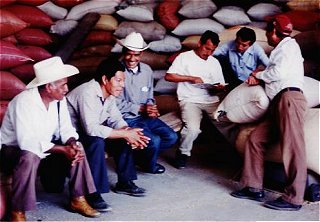# Fair Trade
# Fair Trade is not charity, it is business, business in which all players win.
The Sexto Sol Center assists grower-managed cooperatives to enter into Fair Trade and to become "export ready". Inquiries about the availability of coffee are welcome: tamara@sextosol.org with cc to tierralinda@ecomail.org or call Mexico: 52-1--962-09-4824. We also assist a cooperative to export organic, fair trade honey.
Sexto Sol assists small, grower-managed organizations to become "certified" to sell under fair trade contracts. We provide the guidance to help farmers grow in their ability to administer their own enterprise. See Coffee Solutions for more information on the work of the Sexto Sol Center with coffee cooperatives.

To create fairness in commerce, we all can particpate in the chain where each link is forged from the commitment to equity. The growers act in accordance with fair trade principles, the buyer pays fairly, but for it all to work, coffee drinkers need to add their part by buying and enjoying coffee that has come to them via this mindful process.
# Photo: Celebrating the successful sale of their coop's harvest accomplished with Sexto Sol's help
# Allies to small-scale coffee growers: People making a difference by the way they do business
In recent years a movement has grown on college campuses to promote fair trade. Churches, and even some cities in the US have adopted measures to serve only fair trade coffee in their offices.
We encourage you to support coffee brokers and roasters who have made a commitment to trading fairly. These businesses actually pay more for coffee in order to provide a fair price to growers. Some of them are Higher Grounds Trading Company, Stumptown Coffee, Green Mountain Coffee Roasters, Bongo Java, Dean's Beans, Equal Exchange, Sustainable Harvest, Café Campesino, Thanksgiving Coffee, and Arbuckle Coffee Roasters among others. We hope your neighborhood roaster is serving fair trade coffee. Give them your business. Let other roasters know that you support fair trade in coffee. Buy organic whenever you have a chance.
Root Capital is an innovative non-profit that empowers organizations by providing them with the much needed loans that make it possible for them to pay members/growers for the coffee so that it can then be exported. Lack of access to credit is the biggest obstacle organizations face when they want to export their coffee.
Cooperative Coffees is a consortium of roasters in the U.S. and Canada that pool their purchasing power to buy directly from grower organizations, paying them a fair price. This is the ideal for equitable treatment of growers.
Paul Katseff, CEO of Thanksgiving Coffee, has written "Cupper's Manifesto", a manual that aims to help grower organizations assure that their coffee will be high quality. This better positions them to have success exporting directly to buyers interested in premium coffee. The members of Nuevo Billaj cooperative in Guatemala whom Sexto Sol serves use this book.
Thanks to the work of Global Exchange, TransFair U.S.A. and others, there is now more demand for Fair Trade coffee than supply. This is great news for small-scale coffee grower cooperatives. Other companies are doing direct business with growers for a fair price calling their coffee "fairly traded". You can ask them for more information on their buying practices.
We commend the Specialty Coffee Association of America for giving importance to the issues facing growers in their work to create a system for trade in Specialty Coffee.
# Definition of Sustainable Trade from the Institute for Environment and Development
Sustainable trade takes place when the international exchange of goods and services yields positive social, economic and environmental benefits, reflecting the four core criteria of sustainable development:
- it generates economic value...
- it reduces poverty and inequality...
- it regenerates the environmental resource base, and…
- it is carried out within an open and accountable system of governance
# There is always room for improvement
# Development work is ultimately the process of helping people to develop their own capabilities and to take charge of their own destinies.
For northern NGOs, the practice of sustainable development carries great responsibility, especially when they control access to markets as is the case with the fair trade movement. Ideally the Fair Trade registry (FLO's list of certified organizaitons) would be open to all who qualify. Competion for sales should be based on the quality of the cup since it is only "fair" that Fair Trade buyers be offered the opportunity to purchase the best quality coffee. They should be able to choose among many cooperatives to find one that suits their needs. The demand for fair trade coffee from the Sierra Madre of Chiapas in 2010 has exceeded the supply. This means that the gatekeepers might need to open the gate a bit wider to allow business to flow with the demand.
We encourage all involved to examine the minimum fair trade price to insure that it reflect real costs to farmers and take into account the relatively high cost of the yearly inspection fees charged by FLO. Farmers organizations struggle to bring the coffee to their warehouses without the capital needed at the time of harvest. Listening to their concerns is crucial.
 The Sexto Sol Center
The Sexto Sol Center 